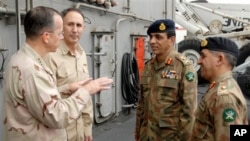Pakistan’s spy chief has told top political leaders of the country that his agency maintains contacts with elements within the anti-American Haqqani network, but does not do so in order to wage a proxy war against the U.S. interests in neighboring Afghanistan, but for the purpose of seeking peace. Lt. Gen. Ahmed Shuja Pasha made his comments while briefing a national conference of Pakistani military and political leaders.
Prime Minister Yousuf Raza Gilani organized Thursday's unusual “all-party conference,” which included more than 50 top politicians from Pakistan's rival political parties and military leaders, in order to demonstrate national unity and formulate his country’s response to escalating U.S. allegations that the Pakistani spy agency is helping the Haqqani network, an al-Qaida-linked Afghan militant group, carry out deadly attacks on U.S. targets in Afghanistan.
General Ahmed Shuja Pasha, chief of the powerful Inter-Services-Intelligence directorate, or ISI, was invited to brief the meeting on U.S. allegations that his agency is facilitating militant attacks on coalition forces in Afghanistan.
The marathon meeting, which lasted nearly eight hours, ended with a statement rejecting as baseless accusations made by Adm. Mike Mullen, outgoing Chairman of the U.S. Joint Chiefs of Staff. Mullen told a U.S. congressional committee last week that the Haqqani network is a "veritable arm" of the ISI.
Speaking to VOA after the meeting, Pakistani Information Minister Firdous Ashiq Awan said the participants, in a joint resolution, rejected Mullen’s charges as "without substance and derogatory to a partnership approach." She said ISI chief Pasha categorically denied any links between his agency and the militants of the Haqqani network.
“He clearly mentioned that silent partners, silent family members [of Haqqani] were living peacefully in [the northwestern Pakistani town] Bannu and North Waziristan or other areas," she said. "They [the ISI] had some association or some sort of linkages [with those Haqqani members] just for information sharing. The other sons of the Haqqanis who are operating, who are functional [in Afghanistan], who are supporting al-Qaida, our intelligence agencies, they have nothing to do with that.”
She said that in their joint statement, politicians representing 32 of the country's political parties extended full support to Pakistan’s armed forces "in defeating any threat to national security."
Minister Awan said American officials should speak directly to their Pakistani counterparts if they have solid evidence of links between the ISI and the Haqqani network, and should stop issuing threatening statements through the media.
“If there is any [trust] gap, we should address that gap but keep in mind ... that any aggression or unilateral action against Pakistan will not tolerate and the whole nation will stand beside our security institutions and will defend our territorial integrity and sovereignty."
During his congressional testimony last week, Mullen said ISI had supported Haqqani network militants in attacking the U.S. embassy in Kabul and carrying out a truck bombing at a NATO base in Afghanistan's Wardak province earlier in September. The truck bombing wounded more than 70 U.S soldiers.
The U.S. has been demanding that Pakistan's military go after the Haqqani network's bases in Pakistan's North Waziristan region in order to prevent the cross-border raids on coalition forces in Afghanistan. But Pakistani leaders have deflected the pressure, saying they are not ready to open a new front in the anti-militant campaign because their troops are busy consolidating gains in other areas along the Afghan border.
Mullen's allegations have triggered fears among politicians and media in Pakistan that Washington is preparing to unilaterally attack Haqqani bases inside Pakistan.
Information Minister Awan says such a move would be detrimental to bilateral ties and peace efforts in Afghanistan.
"They should respect our sovereignty, solidarity and territorial integrity, they should not hurt that sovereignty because [the] people of Pakistan, their point of view is that we have sacrificed a lot for this war against terrorism and the world should recognize our sacrifices," he said.
In his opening address to the all-party conference, Prime Minister Gilani also rejected the American allegations. He said that Pakistan cannot be pressured to do more to fight militants, adding that what he called the "blame game" is counterproductive and needs to be stopped.




